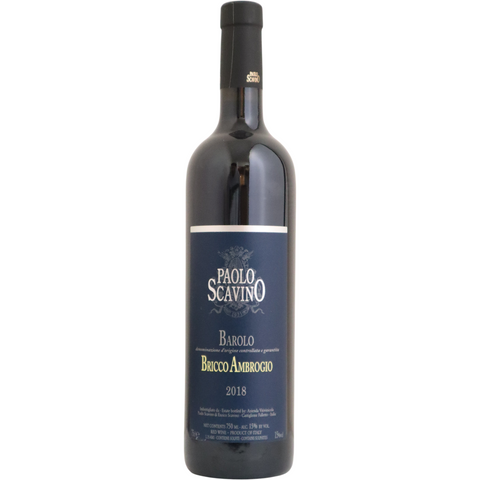
2020 Paolo Scavino Barolo "Bricco Ambrogio", Piedmont, Italy
Bricco Ambrogio has an intense and multifaceted aromatic spectrum. The core is soft and polished through a beautiful acid-tannic balance. There is an underlying depth in this Barolo and the finish is long and nuanced.
There are 1 units left in stock.
ABOUT THIS WINE
100% Nebbiolo from Bricco Ambrogio in Roddi village which is the most important vineyard in the village of Roddi. The vineyard sight sites at an elevation of 275 meters elevation with a south/southeast exposure. The soils here are a mixture of marl and limestone.
This wine was made for the first time in 2002 and is nearly a monopole.
Harvested by hand, normally after the 10th of October. The vinification involves a submerged-cap maceration (10-12 days in average). Fermentation lasts for 20-30 days on average in stainless steel with temperature controlled and indigenous yeasts. Malolactic fermentation takes place in 225 L barrels over the winter. The wine is aged for 11 months in neutral French oak barrels and further 13 months in large casks, plus 8 months in stainless steel and 6 months in bottle.
ABOUT THIS PRODUCER
The most remarkable thing about Enrico Scavino is that even today, this man ever longs to make better Barolo. Generations at the helm of his family estate, founded in 1921, have already proven him a leader in the qualitative advances that have occurred in the Barolo area. And yet, he has never stopped the experimentation that has always kept him on the avant-garde of the Langhe area. He continues to vinify his wines parcel by parcel, taking advantage of these small fermentations to try to make better wines. In fact, in 2007 Enrico has even designed and fabricated his own fermentation vessel, used exclusively on his Barolo, to improve the finesse of extraction from his nebbiolo. Now with his daughters Elisa and Enrica working with him full-time, it would seem possible for this statesman—contemporary of Domenico Clerico and Elio Altare—to take a step back. Instead, Enrico’s passion is further bolstered by the presence of the next generation! And speaking of family, I’d be remiss not to mention that Enrico’s first cousin and neighbor is Luigi Scavino of Azelia fame. Alfonso, father of Luigi, and his brother Paolo, father to Enrico, divided ownership of the 11 hectare Scavino farm in the 1950s, giving each an equal share of the famed Fiasco hill.
Winemaking at the estate has evolved over time—but the one constant, even from the days of Enrica and Elisa’s grandfather, was hygiene: the cleanliness of the winery and health of the grapes remain paramount. Technology has had its influence: Enrico recalls working the vineyards with oxen and horses, and said of the purchase of his first tractor “I couldn’t have been happier if my father had gifted me a Ferrari!” In 1993, rotofermentors arrived at the estate, and between 1996-1999, Slavonian casks were replaced with French oak—but barriques here were always and only used for the first 10 months of aging to help fix color before the wines were transferred to larger oak botti. The percentage of new oak has been much reduced from a height of 30% from the 1990s to 2004, to only 20% new from 2004 – 2008, 17% new in 2011 & 2012, and for the 2015 harvest they have even reduced to a further 14% new. Quality control is crucial. Scavino could make more wine—but the estate chooses to sell off from 10-30% of the production in bulk to maintain their super high standards. This small family farm—which essentially started with 5.5 hectares—now manages 29 hectares of vineyards, and regularly finds itself classified amongst the other top estates of the region.
Details:
| Grape(s) | Nebbiolo |
| Farming | Sustainable |
